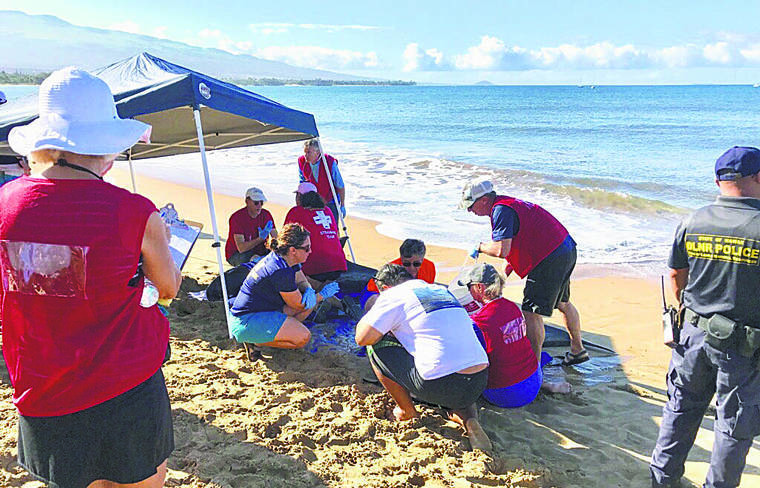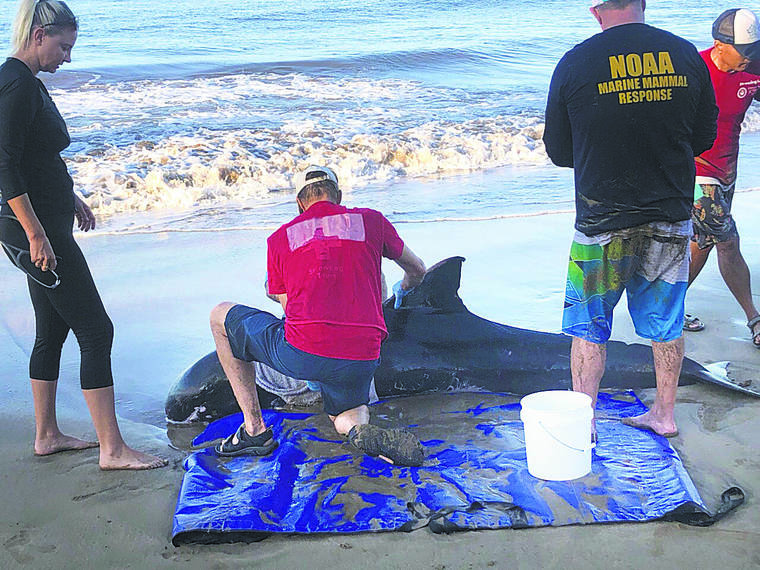Pygmy killer whales euthanized after stranding on Maui beach

NOAA / PERMIT 18786
A National Oceanic and Atmospheric Administration team responded Tuesday morning to reports of two stranded pygmy killer whales. The whales were part of a pod of six that NOAA had been monitoring at Maalaea Bay since Sept. 13.

NOAA / PERMIT 18786
A National Oceanic and Atmospheric Administration team responded Tuesday morning to reports of two stranded pygmy killer whales. The whales were part of a pod of six that NOAA had been monitoring at Maalaea Bay since Sept. 13.


National Oceanic and Atmospheric Administration officials said two pygmy killer whales were euthanized after stranding this morning on a shore near Sugar Beach on Maui due to illness.
A NOAA team responded early this morning to reports of the two stranded, adult pygmy killer whales. These two whales were part of a pod of six that NOAA had been monitoring at Maalaea Bay since Sept. 13.
They are, however, not the six whales that were refloated back to sea from an earlier Aug. 29 incident, based on dorsal fin identification, according to David Schofield, NOAA’s regional marine mammal response coordinator.
“After veterinary assessment, including blood tests, the whales were humanely euthanized,” NOAA said in a statement. “Their bodies will be flown to Oahu for post mortem examination by the University of Hawaii Stranding Lab. We continue to monitor four other pygmy killer whales that are milling close to shore in the same area.”
NOAA responded at 5:55 a.m. today after someone called its hotline reporting two stranded whales by the Sugar Beach Resort in Kihei.
“This wasn’t a very surprising call because we had been monitoring six pygmy killer whales for about 10 days,” said Schofield.
Don't miss out on what's happening!
Stay in touch with breaking news, as it happens, conveniently in your email inbox. It's FREE!
Both of the whales that stranded this morning appeared emaciated, said Schofield, and had labored respiratory rates. Veterinarians collected blood samples, and results indicated that they were likely suffering from an inflammatory illness.
“I know people at the beach wanted us to put the whales back into the water and let them swim off,” said Schofield. “When whales strand, they strand for a reason and usually it’s basically because they’re very sick.”
Based on those blood test results, Schofield said: “It would have been inhumane of us to put these animals back to the wild.”
The four remaining whales that are part of the group remain at Maalaea Bay, and are hanging out between Sugar Beach and Kihei Canoe Club.
Schofield said the team hopes the four will return to sea tonight with the high tide, given that they are deep-sea mammals.
“We will be monitoring them, and will be ready to respond if they strand and don’t leave the area,” he said.
On Aug. 29, NOAA officials also responded to 10 whales that had stranded themselves in front of Sugar Beach Resort in Kihei.
Officials euthanized four of the whales, while eventually refloating the other six back to sea after numerous attempts. A whale calf not counted among the 10 also died on the same shoreline later that day.
NOAA officials recently announced findings from necropsy results Opens in a new tab of the whale calf and four euthanized whales.
The calf suffered from pneumonia, and the other four, including a lactating female, had lung abnormalities and enlarged lymph nodes, indicating they battled some kind of infection.
At the same time, NOAA noted a group of six pygmy whales had recently been spotted swimming at Maalaea Bay, but could not confirm if they were the same six that were earlier refloated.
From drone footage provided with the assistance of the Pacific Whale Foundation, four of the whales appeared healthy and two debilitated. Based on past observations, NOAA officials said they have witnessed healthier animals providing “caregiving behavior” for sick individuals.
Schofield said mass strandings, defined as two or more mammals that are not a mother and calf, are generally rare. Among pygmy killer whales, there are often individual strandings, but not mass strandings.
Until necropsy results are available, however, it is difficult to say whether there is a connection between the two groups.
Whales are at the top of the food chain and their health is often an indicator of ocean health, he said, but it would be difficult to speculate at this time if the strandings are connected to climate change.
NOAA asks the public to keep a safe distance from marine mammals, and to report injured or stranded animals to its emergency hotline at 888-256-9840.
———
An earlier version of this story incorrectly said the two euthanized whales were from the original pod discovered on Aug. 29. The two were part of a separate group of whales.




